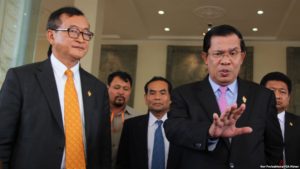Cambodian Government Bans Return of Exiled Opposition Leader
 The Cambodian government officially exiled Sam Rainsy, the head of Cambodia’s main opposition party, on October 23, ordering immigration officials to take “all legal action” to prevent his return. Rainsy has lived in self-imposed exile in Paris since 2015 due to charges of political defamation and incitement to violence. The government’s ban follows Rainsy’s announcement of his intention to return and help the Cambodian National Rescue Party (CNRP) contest the 2017 legislative election.
The Cambodian government officially exiled Sam Rainsy, the head of Cambodia’s main opposition party, on October 23, ordering immigration officials to take “all legal action” to prevent his return. Rainsy has lived in self-imposed exile in Paris since 2015 due to charges of political defamation and incitement to violence. The government’s ban follows Rainsy’s announcement of his intention to return and help the Cambodian National Rescue Party (CNRP) contest the 2017 legislative election.
Rainsy first fled Cambodia in 2005, after a government vote led by the ruling Cambodian People’s Party (CPP) revoked his parliamentary immunity. This allowed him to be tried in-absentia for defamation charges, in which he was accused of re-marking maps in such a way as to show that Cambodia had lost territory to Vietnam. A 2013 royal pardon allowed him to return but not to compete in the 2013-2014 election, in which the CPP gained its smallest margin of victory yet in the National Assembly. The CNRP, a coalition of the Sam Rainsy Party and the Human Rights Party, received 55 seats to the CPP’s 68.
International outlets, like the Eurasia Review, have declared the governmental order to be a violation of both international law as well as the Cambodian constitution. Meanwhile, critics within the country argue that the ban is merely a way for Cambodian strongman Hun Sen to further consolidate his power, with Sourn Serey Ratha of the Khmer Power Party calling it “crazy politics.”
While Cambodia is ostensibly a constitutional monarchy, Hun Sen, an ex-Khmer Rouge commander, has been in power since 1985. His rule has seen the continued suppression of civil liberties, including control over the media. Organizations such as Human Rights Watch have accused him of killing and silencing critics of the ruling CPP, and he has been described by outlets like the Sydney Morning Herald as a “wily operator with a history of destroying his opponents.”
Indeed, the CPP has taken action against multiple members of the political opposition over the past 12 months. Most notably, it arrested and stripped of power Kem Sokha, Vice President of the National Assembly and deputy leader of the CNRP, over charges of soliciting prostitution.
The CPP has argued that Rainsy’s return would incite “violence and a breakdown of public order,” as it fears a repetition of protests in response to the 2013-2014 election, which was marked by widespread allegations of voter fraud. Such claims, which the CPP refused to investigate, led to protests over the CPP’s rule and a government crackdown that resulted in four deaths.
Grievances were exacerbated by a low minimum wage and growing Chinese and Vietnamese influence in Cambodian governance. Hun Sen first rose to prominence as part of the Vietnamese invasion of Cambodia and has been responsible for the sale of over 45 percent of public land to foreign investors. This has led some opponents to proclaim him a corrupt foreign puppet. Indeed, Hun Sen’s rule has shepherded in an era of widespread economic growth, boosted by the manufacturing industry, that has exacerbated Cambodia’s high economic inequality.
It appears that, at least for the moment, Rainsy cannot return to Cambodia. Despite this, the CNRP remains “fully committed” to running in the 2017 elections and forming a shadow cabinet to prepare for takeover of the executive branch. If popular resentment holds, the CNRP may not need Rainsy, an opposition politician since 1992, in order to achieve victory. However, such a result will only prove possible if the elections to be held are free and fair. It is the impetus of Hun Sen and the CPP to ensure that they are so.
